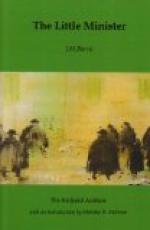“We dauredna let you pass, sir,” the Tilliedrum man said, “without a good look at you. That’s the orders.”
“I hereby swear,” said Wearyworld, authoritatively, “that this is no the Egyptian. Signed, Peter Spens, policeman, called by the vulgar, Wearyworld. Mr. Dishart, you can pass, unless you’ll bide a wee and gie us your crack.”
“You have not found the gypsy, then?” Gavin asked.
“No,” the other policeman said, “but we ken she’s within cry o’ this very spot, and escape she canna.”
“What mortal man can do,” Wearyworld said, “we’re doing: ay, and mair, but she’s auld wecht, and may find bilbie in queer places. Mr. Dishart, my official opinion is that this Egyptian is fearsomely like my snuff-spoon. I’ve kent me drap that spoon on the fender, and be beat to find it in an hour. And yet, a’ the time I was sure it was there. This is a gey mysterious world, and women’s the uncanniest things in’t. It’s hardly mous to think how uncanny they are.”
“This one deserves to be punished,” Gavin said, firmly; “she incited the people to riot.”
“She did,” agreed Weary world, who was supping ravenously on sociability; “ay, she even tried her tricks on me, so that them that kens no better thinks she fooled me. But she’s cracky. To gie her her due, she’s cracky, and as for her being a cuttie, you’ve said yoursel, Mr. Dishart, that we’re all desperately wicked, But we’re sair tried. Has it ever struck you that the trouts bites best on the Sabbath? God’s critturs tempting decent men.”
“Come alang,” cried the Tilliedrum man, impatiently.
“I’m coming, but I maun give Mr. Dishart permission to pass first. Hae you heard, Mr. Dishart,” Wearyworld whispered, “that the Egyptian diddled baith the captain and the shirra? It’s my official opinion that she’s no better than a roasted onion, the which, if you grip it firm, jumps out o’ sicht, leaving its coat in your fingers. Mr. Dishart, you can pass.”
The policeman turned down the school wynd, and Gavin, who had already heard exaggerated accounts of the strange woman’s escape from the town-house, proceeded along the Tenements. He walked in the black shadows of the houses, though across the way there was the morning light.
In talking of the gypsy, the little minister had, as it were, put on the black cap; but now, even though he shook his head angrily with every thought of her, the scene in Windyghoul glimmered before his eyes. Sometimes when he meant to frown he only sighed, and then having sighed he shook himself. He was unpleasantly conscious of his right hand, which had flung the divit. Ah, she was shameless, and it would be a bright day for Thrums that saw the last of her. He hoped the policemen would succeed in—. It was the gladsomeness of innocence that he had seen dancing in the moonlight. A mere woman could not be like that. How soft—. And she had derided him; he, the Auld Licht minister of Thrums, had been




